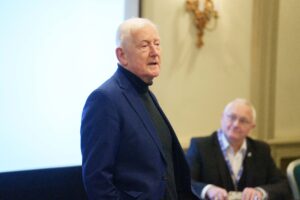Jason Airey, Co-Founder of the Westminster Commission for Road Air Quality began with outlining the main objectives for the Commission; optimise the use of current fuel technologies, investigate hydrogen as a long-term solution and exploring the reduction of non-exhaust pipe emissions.
Nathan Wilson, Account and Market Development Manager, for Allison Transmission UK, introduced transitional technologies that help reduce emissions considerably. Nathan highlighted the government’s commitments to reducing emissions by 78% by 2035 compared to 1990 levels for vehicles in the weight categories 3.5 to 26 tonnes. Transitional technologies are necessary to significantly reduce tailpipe emissions, as fleets aren’t all able to convert to electric or hydrogen just yet.
By introducing solutions for instance like blended fuels, exhaust emissions control systems, hybrid engines, and telematics allowing for transitional resolutions so that fleets can adapt in the short term, making a difference to the environment. Allison Transmission recognises the need for transitional solutions and has developed its FuelSense 2.0 technology this has enabled improved fuel economy and performance. FuelSense2.0 uses sophisticated algorithms to optimise shift points which enable fleets to cut emissions and improve operational efficiency.
FuelSense 2.0 provides fuel savings for the demanding duty cycles of the fleet. This solution uses a unique set of software and electronic controls to deliver quantifiable fuel savings of up to 6%.
FuelSense 2.0 provides an infinitely variable combination of shift points through a set of proprietary software enhancements.
This innovative shift scheduling uses an algorithm to choose the optimal shift point based on your vehicle, specifications, and environmental parameters, continuously delivering the ideal fuel economy and performance balance. DynActive Shifting enables vehicles to operate at peak efficiency, no matter the driving conditions.
The testing on Biffa’s refuse collection vehicles resulted in savings of 8.85% in fuel usage, with expected fuel costs cut by £600,000 and a 1,600-tonne reduction in CO2 for the 493 upgraded vehicles.
FuelSense2.0 is compatible with all Euro VI engines, which is an ideal way forward to the transition to a cost-effective solution.
Jason Airey asked Nathan if any testing on other emissions – such as NOX – was carried out. ‘Although exact figures have not been calculated, it was found that total emission savings between 2.5-3-tonnes per vehicle per year were consistently achievable. The approach to decarbonisation of HGV vehicles must be considered differently to that of other vehicle sectors, given their vital importance to society as a whole,’ he commented.
Hydrogen – now
Stefan Mandix Aagaard, Chief Sales Officer, Octopus Hydrogen outlined how hydrogen can be used today as a transitional fuel but also as a long-term solution. Stefan highlighted that electrifying vehicles should be done where possible to reduce tailpipe emissions, but he understands that this is not possible in all sectors. Highlighting how hydrogen can be used to replace diesel-powered fleets that electrifying isn’t an option, such as electric ranges not meeting mileage expectations in the haulage industries.
Introducing hydrogen fuels to ‘fill the gaps’ of electrifying fleets allows net zero to be achieved faster. However, Stefan discussed the main issues which are the current cost and availability of applications, and the access to ‘green hydrogen’. This creates a paradox with a lack of investments into solutions for hydrogen-powered fuels due to a lack of vehicles, but Octopus Hydrogen is breaking that paradox by providing a flexible hydrogen fuel solution – green hydrogen as a service.
Stefan explained how Octopus Hydrogen’s solution is to create a model that has de-centralised production combined with mobile and agile depot-based fuelling. Providing ‘Green hydrogen as a service is the best solution for the market. It offers predictable low-cost structures, accelerating decarbonisation strategies and increased brand value,’ he explained.
Steve Douglas Head of Product Management, Bucher Municipal, asked why Hydrogen is only used as a fuel in fuel cells rather than burning it directly. Stefan explained how the efficiency of fuel cells is superior despite the expense and difficulties of maintaining fuel cells.
Jason concluded the meeting by acknowledging the key areas of the working party and discussing the ideas to grow some interest around the subject so that Barry Sheerman, MP, can put forward some questions and move things forward in parliament.
If you would like to make a difference to the quality of the air we breathe, contact us today at jason.pidgeon@visiecommunication.co.uk




